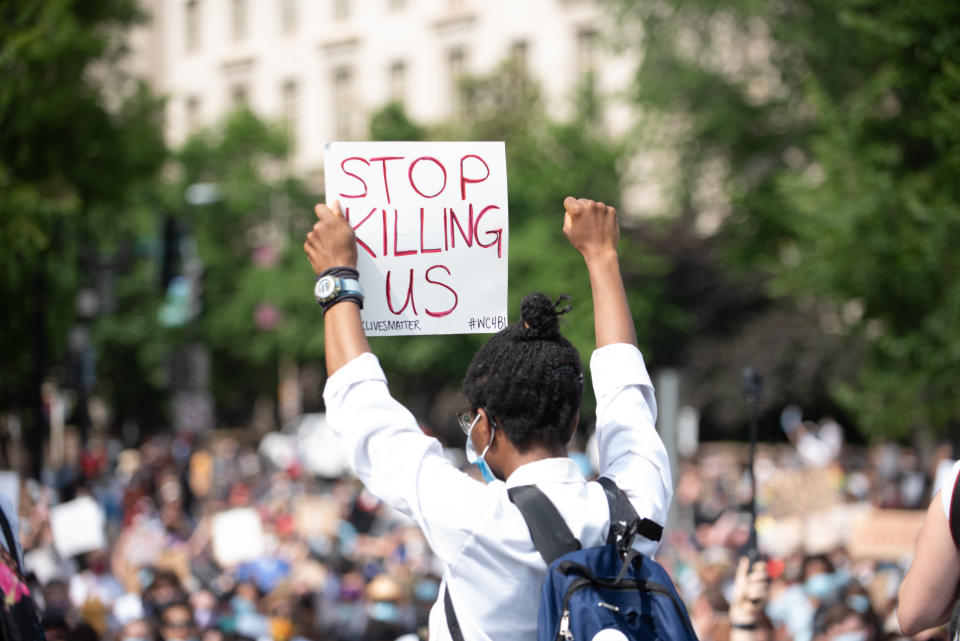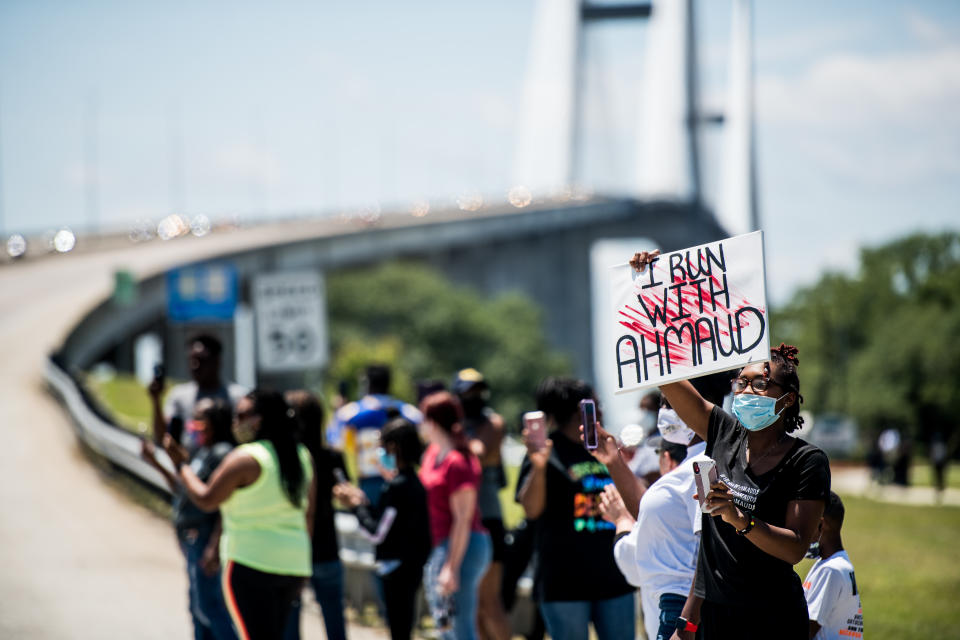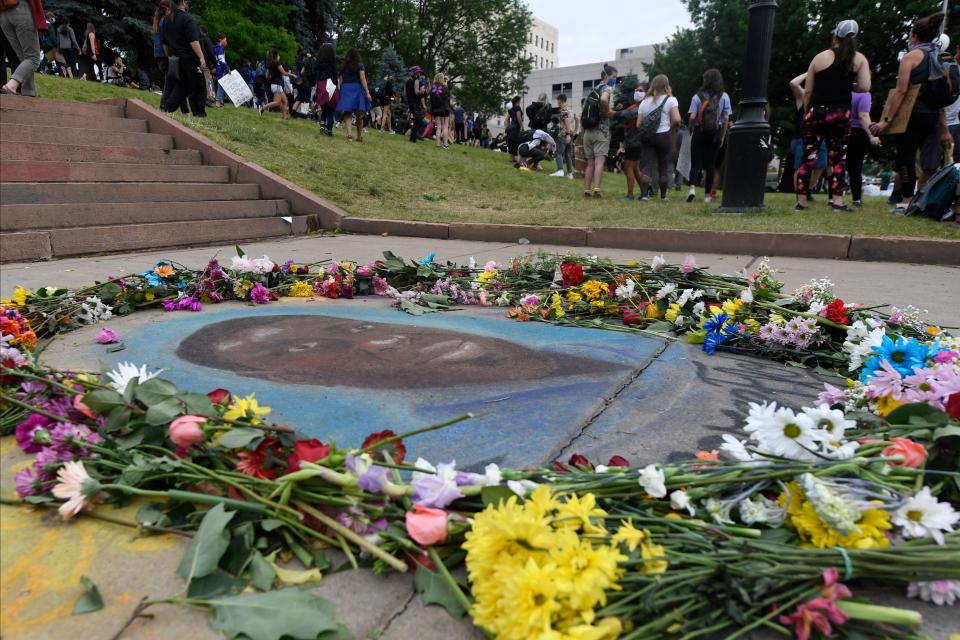Calls for systemic change after George Floyd’s killing are met with pushback on the right
WASHINGTON – The conservative pushback to the public outcry over George Floyd’s killing arguably began on Tucker Carlson’s primetime Fox News commentary show.
As early as May 30, Carlson was unusual in focusing on violent incidents during protests in Minneapolis, setting him apart even among right-wing pundits like talk radio host Rush Limbaugh and fellow Fox News host Jeanine Pirro, who at that point were lamenting Floyd’s death.
By Monday night, just over an hour after federal law enforcement officers charged mostly peaceful protesters and pushed them out of Lafayette Park, followed by President Trump’s photo-op in front of St. John’s church, Carlson unleashed a furious tirade.
“Politicians on both sides tell us that this is all about the death of a man in police custody in Minneapolis last week, the people burning down our country are protesters, they're engaged in a legitimate protest,” Carlson said. “OK, what exactly are those protesters' demands? What are they asking for? If Congress agreed to enact their program, what would the program be?”
Carlson spent much of his monologue cataloguing violent incidents in numerous U.S. cities that seemed to many to be close to spiraling out of control. Attorney General William Barr on Sunday morning called the previous Sunday “the most violent day in Washington in 30 years,” a reference back to the Mount Pleasant riots of 1991.

Many public figures have sought to quickly condemn violence and looting, while keeping their focus on peaceful protesters. And public polling has shown that the majority of Americans do not condone violence and looting, and that many saw unrest as overshadowing the protests. But Carlson implied there weren’t really peaceful protesters at all.
Carlson lit into America’s political leaders, focusing entirely on Republicans rather than Democrats, as if to shame them into more robust condemnations. He started with two Republicans considered potential 2024 presidential contenders: Vice President Mike Pence and former U.N. Ambassador Nikki Haley. He threw in a few other lesser-known conservatives for good measure, and then also blasted Trump — known to watch his show — for not doing more.
“People will not forgive weakness,” Carlson said.
Laced throughout Carlson’s biting commentary were various asides that revealed his anger at the idea that he and other Americans should have to feel any guilt for what had happened to Floyd.
“Like the rest of us caused this by our sinfulness,” Carlson said sarcastically.
He played out a theoretical line of thought. “‘Wait a second,’ you may be wondering, ‘How am I personally responsible for the behavior of a Minneapolis police officer?’ ‘I've never even been to Minneapolis,’ you may think to yourself. ‘And why is some politician telling me I'm required to be upset about it?’”
Carlson’s diatribe contained the foundational elements of an emerging right-wing response to the Floyd killing, and the nation’s horrified reaction to seeing a black killed on camera, once again, in front of its eyes.

The template had a few key points: focus on the violence and looting rather than peaceful protests against systemic racism; accuse the peaceful demonstrators of having no real agenda; deny that systemic racism exists, broadly speaking or particularly in policing, despite significant evidence that the justice system treats black and white people in vastly different ways; and imply that Floyd himself was not a good person and should not stand for something bigger.
Eric Metaxas, a prominent Trump ally among white evangelical Christians, invited British provocateur Katie Hopkins on his radio show Wednesday. Hopkins had told her one million Twitter followers earlier in the day that the Black Lives Matter movement had no demands.
During their conversation, Metaxas categorically rejected the idea that systemic racism exists.
“This is what takes real vision and clarity and leadership to articulate: but the idea of systemic racism, the idea of white privilege, I reject both of those ideas as manufactured by people who are really cultural Marxists,” Metaxas said.
That echoed what Trump’s own national security adviser, Robert O’Brien, had said in a CNN interview a week ago when asked about bias in policing. “I don’t think there’s systemic racism,” O’Brien said.
“No, I don’t think there’s systemic racism,” White House National Security adviser Robert O’Brien says about US law enforcement agencies. “There’s a few bad apples that are giving law enforcement a terrible name” #CNNSOTU pic.twitter.com/9Tm9mx4mP9
— CNN Politics (@CNNPolitics) May 31, 2020
At least one Republican leader — who also happens to be the only African-American Republican in the U.S. Senate — was quick to reject that claim. “For someone to suggest that there aren’t racial challenges and patterns is for someone to be blind,” Sen. Tim Scott, R-S.C., said Sunday when asked about O’Brien’s comment. “For those who believe that racism is dead and gone and that 99.9% of any group is pure, they’re just living in a different universe.” But even Scott shied away from using the term “systemic racism.”
And the chorus went on among conservatives throughout the week. On Tuesday, the Wall Street Journal published an op-ed by Heather MacDonald, a hardline conservative, headlined “The Myth of Systemic Police Racism.” National Review on Wednesday published a similar article by Andrew C. McCarthy headlined, “The ‘Institutional Racism’ Canard.”
Both pieces focused mostly on incidents of black men killed by police.
“A police officer is 18½ times more likely to be killed by a black male than an unarmed black male is to be killed by a police officer,” MacDonald wrote, repeating a statistic that originated with her but which has become a regular talking point on the right for years.
Charlie Kirk, a young conservative activist, in 2018 tweeted that statistic and then added: “Black on black crime, not police brutality is the big issue facing black America. This all stems from a broken culture – failing schools & fatherless homes.”
Kirk’s implication: Black people’s most significant problems are their own fault.

There are critiques of how MacDonald formulated her statistics, but the larger point is that the argument about systemic racism goes beyond police killings.
There is voluminous data to support the argument that black people in general and black men in particular are treated in vastly different ways by police than other groups, especially white people. One example is the lengthy list of studies and findings compiled by journalist Radley Balko in 2018.
The evidence looks at black people’s experience in the American justice system both upstream and downstream from when they interact with police officers. That continuum begins for many with traffic stops: A 2018 book reported that a review of 20 million traffic stops in North Carolina from 2002 to 2016 showed that black people were twice as likely to be stopped by police as white people, despite driving less overall.
On the back end of the continuum are disparities in sentencing, a widely acknowledged problem. There is also evidence that the plea bargain system is abused in a way that bypasses fair trials and results in worse outcomes for black people. There are also indications of similar problems with the issuance of bail, pretrial detention, and post-conviction commutations and pardons.
Then there is the issue of vast racial differences in the use of the death penalty and the simple fact that “the black imprisonment rate at the end of 2018 was nearly twice the rate among Hispanics (797 per 100,000) and more than five times the rate among whites (268 per 100,000),” according to the Pew Research Center. The Pew report noted that despite these severe inequities, rates of incarceration were declining for all groups, including blacks.

And the justice system is only one layer. The “systemic racism” argument is grounded in the notion that the teaching of American history glosses over the ways that white supremacy was upheld through systemic oppression long after the abolishment of slavery, often with savage violence used as an enforcement mechanism. Progress has been made, the argument goes, but also there are still many ways in which people born today face very different odds depending on the color of their skin. Those odds involve generational wealth, housing policy over the decades, schools, mass incarceration and voting rights, to name just a few issues.
As the journalist Balko wrote in 2018: “Of particular concern to some on the right is the term ‘systemic racism,’ often wrongly interpreted as an accusation that everyone in the system is racist. In fact, systemic racism means almost the opposite. It means that we have systems and institutions that produce racially disparate outcomes, regardless of the intentions of the people who work within them. When you consider that much of the criminal-justice system was built, honed and firmly established during the Jim Crow era — an era almost everyone, conservatives included, will concede rife with racism — this is pretty intuitive.”
But there is also the challenge of insufficient standards for data collection on police shootings. Social scientists are working to improve this, and there is proposed legislation in the Congress — backed by Scott and other Republicans — to mandate that states collect it.
And then there is also the fact that George Floyd’s death in full view of a cellphone camera was only the latest in what is now a long string of names of black men and women killed by police or vigilantes over the last several years, many caught on video: Michael Brown, Eric Garner, Tamir Rice, Walter Scott, Alton Sterling, Philando Castile, Botham Jean, Sandra Bland, Freddie Gray, and most recently Ahmaud Arbery, Breonna Taylor and Floyd.

And as Scott said on Fox News last Sunday to journalist Chris Wallace, without the video evidence, many of these killings would have gone uninvestigated, unsolved, unpunished and unnoticed. That raises questions about how extensively and how long this had gone on before the advent of cellphone cameras.
“Had it not been for someone videotaping this, it would not have happened,” Scott said of Floyd’s killing, which he has on multiple occasions called a “murder.” “If it had not been for [Ahmaud] Arbery being videotaped, it would not have happened. Even though it happened, none of us would have known about it.”
“The Walter Scott case in 2015, had it not been for a video, it would not have happened,” Scott said, referring to the 50-year old black man who was shot in the back by a white police officer in North Charleston, S.C., where Scott grew up. “And when you read the police reports, you come to the conclusion that it didn't happen the way it happened until you have a video that substantiates what it is.”
Barr, in his interview on CBS’s “Face the Nation” this weekend, rejected claims that systemic racism persists today and said the perception of institutional bias is bolstered by the nation’s history of systemic racism.
“I think there's racism in the United States still, but I don't think that the law enforcement system is systemically racist,” Barr said. “I understand the distrust, however, of the African-American community given the history in this country. I think we have to recognize that for most of our history, our institutions were explicitly racist. Since the 1960s, I think we've been in a phase of reforming our institutions and making sure that they're in sync with our laws and aren't fighting a rearguard action to impose inequities.”

Another form of pushback to the outpouring of grief over Floyd’s death came on Wednesday, when Candace Owens, a black Trump supporter and online personality, posted a freewheeling 18-minute monologue on Facebook that had all the hallmarks of a missive intended, more than anything, to inspire outrage and draw attention. The gambit worked: By Saturday, the post had 1.2 million reactions and over 700,000 comments.
Owens headlined her video, “I DO NOT support George Floyd and I refuse to see him as a martyr.” Owens said many things in the video, including condemning Floyd’s killing, but the main takeaway was that his death did not represent a larger problem and so Floyd should not become a symbol of a movement. Owens’s method for undermining the larger message was to take aim at the notion that George Floyd was a good person.
That’s in spite of the fact that Christianity Today magazine has reported about Floyd’s involvement in working to help churches reach his lower-income Minneapolis neighborhood, describing him as “a mentor to a generation of young men and a ‘person of peace’ ushering ministries into the area.”
Nonetheless, by Friday, the president himself had retweeted Owens’s message, amplifying a video of an Owens interview that carried the message, “The fact that he has been held up as a martyr sickens me."
Asked Friday how he would tackle systemic racism, Trump said, “My plan is: We’re going to have the strongest economy in the world.”
_____
Read more from Yahoo News:



